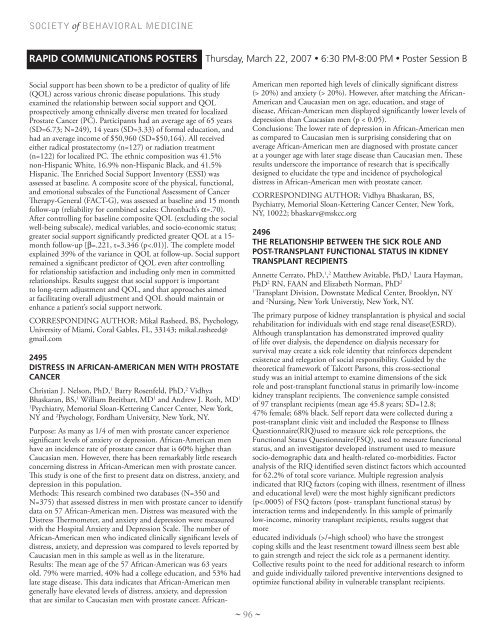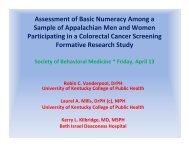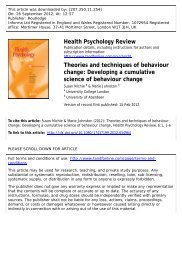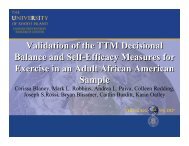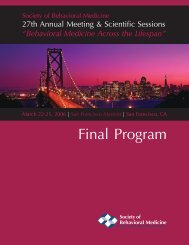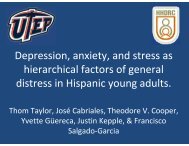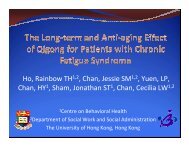2007 Final Program - Society of Behavioral Medicine
2007 Final Program - Society of Behavioral Medicine
2007 Final Program - Society of Behavioral Medicine
You also want an ePaper? Increase the reach of your titles
YUMPU automatically turns print PDFs into web optimized ePapers that Google loves.
SOCIETY <strong>of</strong> BEHAVIORAL MEDICINE<br />
Rapid Communications Posters Thursday, March 22, <strong>2007</strong> • 6:30 PM-8:00 PM • Poster Session B<br />
Social support has been shown to be a predictor <strong>of</strong> quality <strong>of</strong> life<br />
(QOL) across various chronic disease populations. This study<br />
examined the relationship between social support and QOL<br />
prospectively among ethnically diverse men treated for localized<br />
Prostate Cancer (PC). Participants had an average age <strong>of</strong> 65 years<br />
(SD=6.73; N=249), 14 years (SD=3.33) <strong>of</strong> formal education, and<br />
had an average income <strong>of</strong> $50,960 (SD=$50,164). All received<br />
either radical prostatectomy (n=127) or radiation treatment<br />
(n=122) for localized PC. The ethnic composition was 41.5%<br />
non-Hispanic White, 16.9% non-Hispanic Black, and 41.5%<br />
Hispanic. The Enriched Social Support Inventory (ESSI) was<br />
assessed at baseline. A composite score <strong>of</strong> the physical, functional,<br />
and emotional subscales <strong>of</strong> the Functional Assessment <strong>of</strong> Cancer<br />
Therapy-General (FACT-G), was assessed at baseline and 15 month<br />
follow-up (reliability for combined scales: Chronbach’s α=.70).<br />
After controlling for baseline composite QOL (excluding the social<br />
well-being subscale), medical variables, and socio-economic status;<br />
greater social support significantly predicted greater QOL at a 15-<br />
month follow-up [β=.221, t=3.346 (p 20%) and anxiety (> 20%). However, after matching the African-<br />
American and Caucasian men on age, education, and stage <strong>of</strong><br />
disease, African-American men displayed significantly lower levels <strong>of</strong><br />
depression than Caucasian men (p < 0.05).<br />
Conclusions: The lower rate <strong>of</strong> depression in African-American men<br />
as compared to Caucasian men is surprising considering that on<br />
average African-American men are diagnosed with prostate cancer<br />
at a younger age with later stage disease than Caucasian men. These<br />
results underscore the importance <strong>of</strong> research that is specifically<br />
designed to elucidate the type and incidence <strong>of</strong> psychological<br />
distress in African-American men with prostate cancer.<br />
CORRESPONDING AUTHOR: Vidhya Bhaskaran, BS,<br />
Psychiatry, Memorial Sloan-Kettering Cancer Center, New York,<br />
NY, 10022; bhaskarv@mskcc.org<br />
2496<br />
THE RELATIONSHIP BETWEEN THE SICK ROLE AND<br />
POST-TRANSPLANT FUNCTIONAL STATUS IN KIDNEY<br />
TRANSPLANT RECIPIENTS<br />
Annette Cerrato, PhD, 1 , 2 Matthew Avitable, PhD, 1 Laura Hayman,<br />
PhD 2 RN, FAAN and Elizabeth Norman, PhD 2<br />
1<br />
Transplant Division, Downstate Medical Center, Brooklyn, NY<br />
and 2 Nursing, New York Universtiy, New York, NY.<br />
The primary purpose <strong>of</strong> kidney transplantation is physical and social<br />
rehabilitation for individuals with end stage renal disease(ESRD).<br />
Although transplantation has demonstrated improved quality<br />
<strong>of</strong> life over dialysis, the dependence on dialysis necessary for<br />
survival may create a sick role identity that reinforces dependent<br />
existence and relegation <strong>of</strong> social responsibility. Guided by the<br />
theoretical framework <strong>of</strong> Talcott Parsons, this cross-sectional<br />
study was an initial attempt to examine dimensions <strong>of</strong> the sick<br />
role and post-transplant functional status in primarily low-income<br />
kidney transplant recipients. The convenience sample consisted<br />
<strong>of</strong> 97 transplant recipients (mean age 45.8 years; SD=12.8;<br />
47% female; 68% black. Self report data were collected during a<br />
post-transplant clinic visit and included the Response to Illness<br />
Questionnaire(RIQ)used to measure sick role perceptions, the<br />
Functional Status Questionnaire(FSQ), used to measure functional<br />
status, and an investigator developed instrument used to measure<br />
socio-demographic data and health-related co-morbidities. Factor<br />
analysis <strong>of</strong> the RIQ identified seven distinct factors which accounted<br />
for 62.2% <strong>of</strong> total score variance. Multiple regression analysis<br />
indicated that RIQ factors (coping with illness, resentment <strong>of</strong> illness<br />
and educational level) were the most highly significant predictors<br />
(p/=high school) who have the strongest<br />
coping skills and the least resentment toward illness seem best able<br />
to gain strength and reject the sick role as a permanent identity.<br />
Collective results point to the need for additional research to inform<br />
and guide individually tailored preventive interventions designed to<br />
optimize functional ability in vulnerable transplant recipients.


